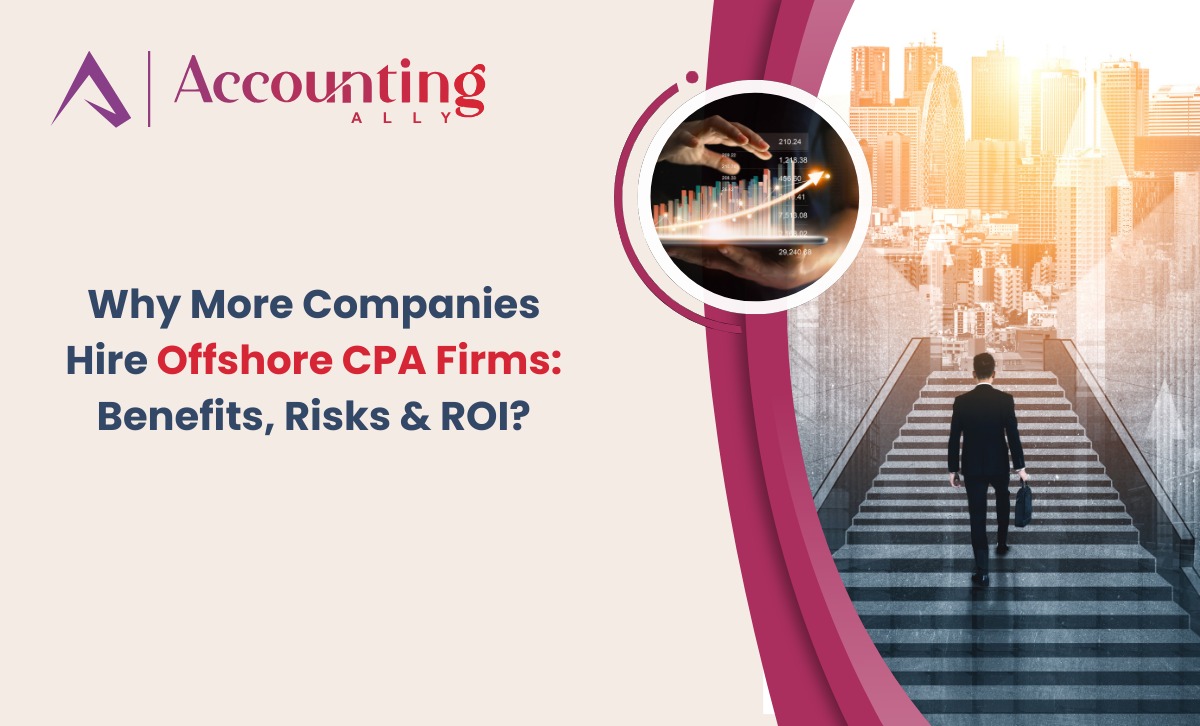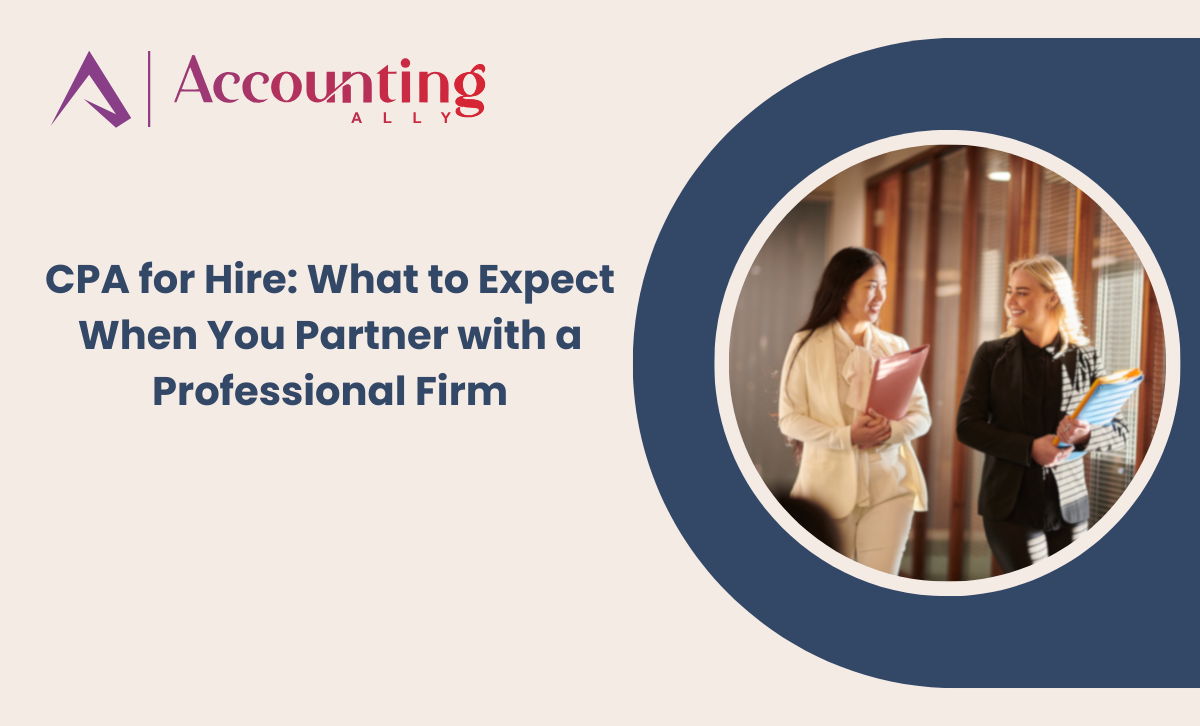Why More Companies Hire Offshore CPA Firms: Benefits, Risks & ROI?
As financial accuracy, strategic planning, and cost efficiency become more critical than ever, businesses are increasingly turning to offshore CPA firms. With local talent become scarce or more expensive, a growing number of businesses are now choosing to hire CPA firms offshore. This trend of leveraging international financial talent is more than just a cost-cutting strategy—it’s a move toward global scalability, operational efficiency, and competitive edge.
This comprehensive blog explores why businesses hire a CPA firm offshore, how it compares to domestic hiring, what risks to consider, and most importantly, how to evaluate the return on investment (ROI) from such a decision.
The Rising Trend of Offshore CPA Hiring
The globalization of business services has made it easier for companies to access skilled professionals from virtually anywhere in the world. Financial services are no exception. Over the last decade, the practice of hiring outsourced accounting bookkeeping has increased dramatically among small to mid-sized companies, startups, and even large corporations.
Many of these businesses cite three primary motivations:
- Cost savings
- Access to a broader talent pool
- Scalability and flexibility
This is particularly attractive in an environment where the cost to hire CPA firm locally continues to rise, and talent shortages persist across developed markets.
Why Companies Hire a CPA Firm Offshore: Key Benefits
1. Cost-Effectiveness
The most obvious advantage is cost. The cost to hire a CPA firm offshore can be 30-70% lower than hiring domestically. This includes:
- Lower hourly rates or salaries
- Reduced overhead (no office space, equipment, or local taxes)
- Minimal onboarding costs
When considering how much to hire a CPA, many U.S.-based businesses find they can get the same (or better) quality of service from an offshore team at a fraction of the price.
2. Scalability
Need to ramp up during tax season or scale down during the slow months? Offshore CPA firms offer incredible flexibility. Unlike traditional hiring models that lock you into full-time employment, offshore firms offer on-demand services that can be scaled up or down as needed.
3. Access to Global Talent
When you look for a CPA for hire offshore, you gain access to professionals trained in international finance, taxation, and GAAP/IFRS compliance. Countries like India, the Philippines, and Eastern European nations have strong accounting education systems, and many professionals are fluent in English.
4. 24/7 Productivity
By leveraging time zone differences, businesses can achieve round-the-clock productivity. Work can be handed off at the end of the day to an offshore team and completed by the time your domestic team starts the next morning.
5. Focus on Core Business
Outsourcing non-core tasks such as payroll, bookkeeping, tax filing, and auditing to offshore CPAs allows internal teams to focus on strategic activities. This leads to improved decision-making and better use of in-house resources.
Understanding the Costs: How Much Does It Cost to Hire a CPA?
When asking, how much does it cost to hire a CPA?, the answer varies depending on geography, experience, and scope of work. Here’s a general comparison:
| Service Type | Domestic CPA (USA) | Offshore CPA (India/Philippines) |
| Bookkeeping | $40-$80/hour | $10-$25/hour |
| Tax Filing | $150-$500+ | $50-$150 |
| Audit Services | $1,000-$5,000+ | $400-$1,500 |
| Monthly Retainer | $1,500-$5,000 | $500-$1,500 |
Clearly, the cost to hire CPA firm offshore is significantly lower, enabling small businesses to access premium services previously only affordable to large corporations.
Potential Risks of Hiring Offshore CPA Firms
While the benefits are numerous, it’s essential to acknowledge the risks involved in offshoring your accounting functions. Understanding these concerns helps in making informed choices and putting preventive measures in place.
1. Data Security and Privacy
When financial data crosses borders, security becomes a critical issue. Companies must ensure that the offshore CPA hired complies with regulations like:
- GDPR (Europe)
- SOX (U.S.)
- HIPAA (for healthcare businesses)
2. Communication Challenges
Time zone differences can be a double-edged sword. Misalignment in work hours may cause delays unless well-coordinated. Also, language barriers, though rare in professional firms, can occasionally pose challenges.
3. Cultural Differences
Business etiquette, deadlines, and work expectations may vary by culture. It’s essential to align processes and expectations early in the engagement.
4. Legal and Compliance Issues
Make sure the offshore CPA firm understands U.S. or your local tax laws thoroughly. Many top-tier offshore firms have U.S. CPAs on staff, but it’s important to verify credentials and compliance experience.
How to Hire Offshore CPA Firms : A Step-by-Step Guide
As more businesses explore the advantages of hiring offshore accounting professionals, understanding the how becomes just as important as knowing the why. The process of finding the right offshore CPA firm isn’t as simple as choosing the cheapest provider — it involves strategic planning, vetting, and clear alignment with your business goals.
Whether you’re a startup navigating your first tax season or an established firm looking to scale efficiently, this step-by-step guide will walk you through the essentials of how to hire a CPA offshore. From defining your needs to securing long-term value, each step helps ensure you choose a trustworthy, skilled, and cost-effective partner with a professional firm in your financial journey.
Hiring an offshore CPA firm can offer incredible advantages, but success depends heavily on a structured and thoughtful selection process. Follow these steps to ensure you hire the right partner for your accounting needs:
Step 1: Identify Your Accounting Needs
Before beginning your search, clearly define the scope of work. Do you need help with:
- Tax preparation and filing?
- Bookkeeping and payroll?
- Audit support and financial reporting?
- Full-service accounting or CFO-level advisory?
Defining the scope will help you narrow your search to firms with relevant expertise.
Step 2: Search for and Shortlist Reputable Offshore CPA Firms
Start researching firms based in top outsourcing destinations like India, the Philippines, Eastern Europe, or Latin America. Use platforms such as:
- Clutch.co
- Upwork or Freelancer (for individual CPAs)
- Referrals from professional networks
Look for firms with strong online presence, detailed service pages, case studies, and verified client reviews.
Step 3: Evaluate Credentials and Experience
When evaluating potential partners:
- Confirm that their accountants hold recognized certifications (CPA, ACCA, CA, etc.).
- Check years of experience, especially with U.S. clients or other international markets.
- Ask for client references and success stories.
Don’t hesitate to verify their registration with regulatory bodies or professional organizations.
Step 4: Assess Communication and Language Proficiency
Effective communication is essential, especially across borders and time zones. Schedule a video interview to:
- Gauge their English fluency
- Evaluate professionalism and responsiveness
- Ensure cultural compatibility
Having a dedicated point of contact or account manager is also a plus.
Step 5: Understand Their Data Security Measures
You’ll be sharing sensitive financial information, so security is non-negotiable. Ensure the firm:
- Uses encrypted file-sharing platforms
- Has role-based access control
- Complies with standards like ISO/IEC 27001, GDPR, or SOC 2
- Is willing to sign NDAs (non-disclosure agreements)
Request documentation of their cybersecurity protocols and ask how they handle data breaches.
Step 6: Clarify Pricing and Engagement Terms
Discuss payment models early:
- Hourly billing vs fixed-fee packages
- Turnaround times and deadlines
- Inclusions and exclusions
- Policies on revisions or additional work
Transparent pricing avoids surprises later. Always request a written agreement or service-level agreement (SLA).
Step 7: Run a Pilot Project for Offshore CPA Firms
Start small by assigning a limited-scope project (e.g., one month of bookkeeping or a single tax return). Use this to:
- Test their technical skills
- Observe communication and workflow
- Evaluate their attention to detail and compliance
If results are satisfactory, consider scaling the relationship gradually.
Step 8: Monitor and Optimize the Relationship
Once the engagement begins, maintain frequent check-ins and set performance benchmarks:
- Use project management tools (e.g., Asana, Trello, Slack)
- Share clear documentation and standardized processes
- Conduct periodic reviews to assess KPIs like accuracy, timeliness, and cost-efficiency
Ongoing feedback helps improve collaboration and long-term outcomes.
Certified Management Accountant vs CPA: Which Do You Need?
A common question that arises is: certified management accountant vs CPA – which professional is best suited for your needs?
- CPA (Certified Public Accountant): Specializes in auditing, tax filing, and compliance. Best for external reporting and statutory requirements.
- CMA (Certified Management Accountant): Focuses on internal business strategies, budgeting, and performance management.
For companies needing financial analysis and strategic planning, a CMA might be ideal. But for compliance, audits, and taxes, a CPA is essential. Offshore CPA firms often provide access to both, depending on your business needs.
Common Risks of Hiring Offshore CPA Firms
As with any business strategy, there are risks involved when you hire offshore accounting professionals. Key concerns include:
1. Data Security
Financial data is highly sensitive. Make sure the offshore firm uses secure communication channels, encryption, and is compliant with international data security standards.
2. Time Zone Differences
While 24/7 productivity is a plus, time zone differences can also lead to communication delays. Mitigate this with clear communication protocols and overlap work hours.
3. Regulatory Compliance
Ensure that the offshore CPA understands U.S. GAAP, IRS codes, and other relevant regulations. Misinterpretation can lead to costly mistakes.
4. Cultural and Language Barriers
Although many offshore CPAs are fluent in English, cultural nuances and communication styles can sometimes cause misunderstandings. Regular check-ins and clear documentation help bridge the gap.
5. Hidden Costs
Be wary of firms that underquote but later charge for add-ons. Always request a detailed breakdown of costs before signing a contract.
Real-World Case Study: Offshore CPA Hired by U.S. Startup
A U.S.-based SaaS startup recently hired offshore CPA services to handle its monthly bookkeeping, tax compliance, and financial reporting. The company compared how much to hire a CPA locally versus offshore. Here were their findings:
- Domestic CPA Quote: $4,200/month
- Offshore CPA Firm: $1,250/month
Savings: $35,400 annually
The offshore CPA hired had extensive experience with U.S. GAAP and IRS tax codes. After a 2-month trial, the firm took over all accounting operations. The startup reported:
- Faster turnaround times
- Higher financial visibility
- Reduced operational costs
Maximizing ROI When You Hire a CPA Firm Offshore
Return on Investment is more than just cost savings. Here’s how companies maximize ROI with an offshore CPA hired:
- Operational Efficiency: Reducing time spent on non-core tasks
- Improved Accuracy: Professional CPA teams reduce errors and rework
- Better Compliance: Avoid penalties through timely tax filings and audits
- Scalable Growth: Add more services as your business grows
Calculate ROI using this basic formula:
ROI = (Total Benefits – Total Costs) / Total Costs x 100
If your offshore CPA firm helps save $50,000/year while costing only $15,000, your ROI is over 230%.
Conclusion
The decision to hire CPA firm offshore is no longer just a trend but a strategic business move. As the cost of hiring and retaining local talent rises, and as globalization makes remote collaboration seamless, the appeal of offshore accounting services grows stronger.
With proper vetting, clear expectations, and attention to data security, companies can reduce costs, improve accuracy, and scale faster by leveraging offshore CPA talent. Whether you’re a startup, SME, or large enterprise, there’s never been a better time to consider CPA for hire offshore.
So, if you’re asking yourself whether it’s time to hire a CPA firm overseas, weigh the pros and cons carefully. The potential for high ROI, improved efficiency, and financial clarity could be exactly what your business needs to move forward.



